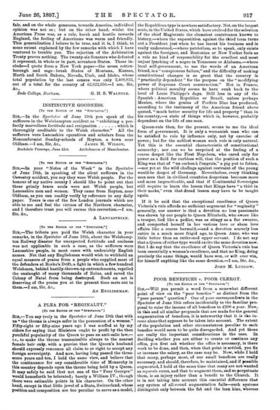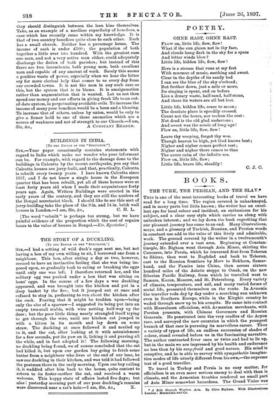POOR BENEFICES v. POOR CLERGY.
[To TEE EDITOR OF THE "SPECTATOR."] SIR,—Will you permit a word from a somewhat different point of view on the "poor benefice" as distinct from the "poor parson" question ? One of your correspondents in the Spectator of June 19th refers incidentally to the familiar pro- posal to raise the income of all benefices to £200 a year. Now, in this and all similar proposals that are made for the general augmentation of benefices, it is noteworthy that it is the in- come alone that appears to be taken into account The extent of the population and other circumstances peculiar to each benefice would seem to be quite disregarded. And yet these are really the important considerations in the case. In deciding whether you are either to create or continue any office, you first ask whether the office is necessary, is there work to be done, and then, when that point is settled, you fix or increase the salary, as the case may be. Now, while I hold that many, perhaps most, of our small benefices are really necessary, and should, therefore, be maintained, and if possible augmented, I hold at the same time that many are not wanted as separate cures, and that to augment them, and so perpetuate them, is an injury rather than a benefit to the Church. It is in not taking into account this essential difference that any system of all-round augmentation fails—such systems distinguish only between the fat and the lean kine, whereas they should distinguish between the lean kine themselves. Take, as an example of a needless superfluity of benefices, a ease which has recently come within my knowledge. It is that of two country benefices quite close to each other. Each has a small church. Neither has a parsonage house. The income of each is under £100; the population of both together a little over two hundred. With the greatest ease one man, and not a very active man either, could adequately discharge the duties of both parishes; but instead of this there are two incumbents, both young men, both excellent men and capable of any amount of work. Surely this seems a positive waste of power, especially when we hear the bitter cry for more clerical help that comes to us every day from our crowded towns. It is not the men in any such case as this, but the system that is to blame. It is amalgamation rather than augmentation that is wanted. Let us not then spend our money and our efforts in giving fresh life to an out- -of-date system, in perpetuating avoidable evils. To increase the income of many poor benefices would be a boon and a blessing. To increase that of others, unless by union, would be only to give a firmer hold to one of those anomalies which are a source of weakness and not of strength to our Church.—I am,



















































 Previous page
Previous page